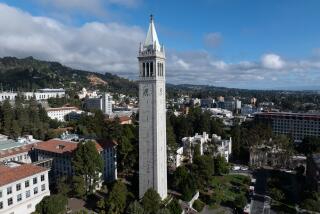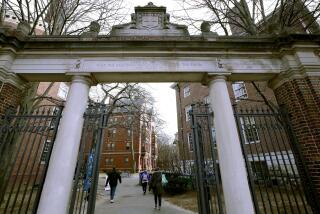Leading UCSD Japan Scholar Leaving for MIT
- Share via
The nation’s foremost authority on the post-World War II American occupation of Japan and how it shaped contemporary Japanese society is leaving his endowed chair at UC San Diego for the Massachusetts Insitute of Technology.
The departure of historian John Dower, the Joseph Naiman Professor of Japanese Studies at UCSD, is “truly a real loss” to the La Jolla campus, literature professor James Lyon, provost at UCSD’s Fifth College and a close colleague of Dower, said last week.
Dower, now on a research sabbatical in Japan, made his decision last month and communicated it to his UCSD colleagues last week. Dower came to UCSD from the University of Wisconsin in 1985 as a key component of the university’s fledgling Japanese studies program.
Reached in Japan late last week, Dower said the move “is really quite a personal decision” reached in large part because his elderly parents live in Rhode Island, not far from the Cambridge campus of MIT.
“My background is in the East, and (my parents) are both in their 80s, and I am the only son,” Dower said, explaining that his decision “was made with a lot of difficulty, because San Diego has been very good to me. . . . I want to make it clear that there is no major disappointment to stress about” being at UCSD.
Dower added that the MIT offer, which will give him access to the vast Asian historical collections at nearby Harvard University, was professionally attractive. Dower will teach an undergraduate course at MIT but will have no administrative duties. MIT has no graduate programs in history.
Areas such as Berkeley, Cambridge and New York have the faculty and programs that “attract many people from abroad, so there is always a constant coming and going of visitors involved in Asia, a critical mass of scholars,” he said.
With his own appointment at UCSD and the establishment of UCSD’s Graduate School of International Relations and Pacific Studies in 1987, Dower said that “San Diego has experienced an extraordinary dynamic growth in Asian studies during the past five years, and I would speak highly of its promise.
“But it still doesn’t have the clarity of how it will mature” and “doesn’t have the (library) resources of a place like Harvard.”
In addition, Dower said, the strong focus of the new graduate school on issues of political economy “means a somewhat different vision of Asia than I entertain.”
Dower’s book, “War Without Mercy: Race and Power in the Pacific War,” won the 1986 National Book Critics Circle Award for Non-Fiction. A documentary film that he co-produced, “Hellfire: A Journey From Hiroshima,” about a husband-and-wife team of Japanese artists who created world-famous murals about the first city destroyed by an atomic bomb, was nominated for an Oscar for Best Documentary in 1988.
Lyon said he felt “like wearing a black armband” because of Dower’s importance not only to Japanese studies at UCSD but to undergraduate teaching in general. Dower played a critical role in planning the curriculum of the Fifth College, most notably its experimental two-year Making of the Modern World course as an interdisciplinary approach to history, literature, sociology and geography, Lyon said.
UCSD literature Prof. Masao Miyoshi, coordinator of the Japanese studies program, said that recruitment of a senior professor equal to Dower’s stature will be difficult.
“There are not that many outstanding historians in the Japanese field, especially on the period after the Second World War, and those that are around, they are already settled in universities and recruitment is not easy, if at all,” Miyoshi said.
“There are some slightly younger good people in various places and we have already been talking among ourselves about some names.”
Japanese modern historian Harry Harootunian, who left the University of Chicago to become a dean at UC Santa Cruz last year, agreed with Miyoshi. Harootunian himself is returning to Chicago to resume teaching and research, unhappy with the lack of resources at Santa Cruz and what he called “a heavily bureaucratized system.”
“I suspect that clearly the best recruitment (strategy) for San Diego will be to get someone a few years younger, not of John’s and my generation, who can give both energy and service.
“But UCSD is a good place, I think much more interesting than Santa Cruz, and so they don’t have go out and recruit just anyone.”
More to Read
Sign up for Essential California
The most important California stories and recommendations in your inbox every morning.
You may occasionally receive promotional content from the Los Angeles Times.










